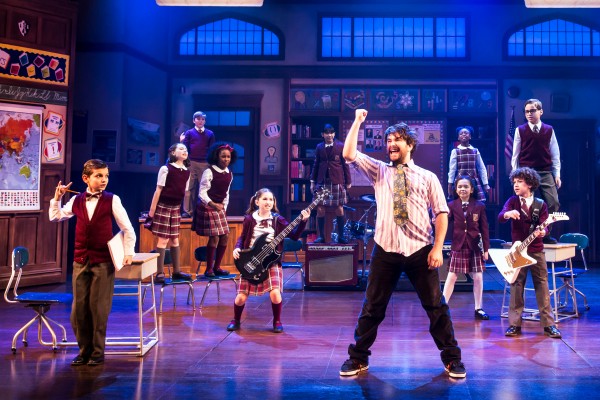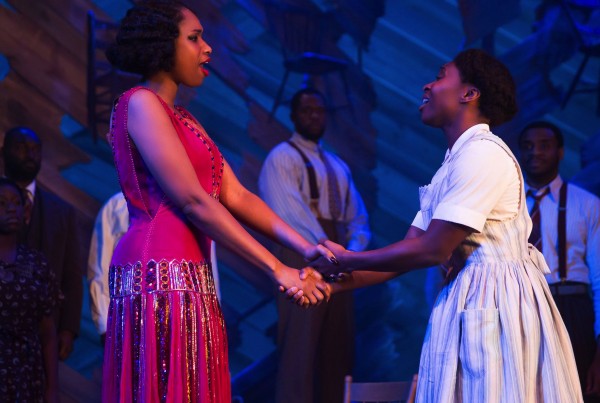“Is this some kind of gimmick?” asks a character about the central device of tweens forming a heavy-metal band in School of Rock, the new Andrew Lloyd Weber musical (The English Lord composed the music and is the lead producer). The answer is yes, it is some kind of gimmick, but it works. The book by Julian Fellowes (of Downton Abbey fame), based on Mike White’s screenplay for the 2003 film starring Jack Black, is pretty much standard-issue Broadway uplift: quirky outsider comes into a repressed society and uses music to get its cringing inhabitants to experience fun and freedom. You can see the ending a mile away, yet there is so much infectious enthusiasm and unbridled talent on display, you fall for it.

Credit: Matthew Murphy
The show starts slowly, with Fellowes’ supplying obvious jokes and director Laurence Connor going for broad stereotypes. Wanna-be rock star and full-time slacker Dewey Finn (a riotously funny Alex Brightman) has been kicked out of his band and is about to be similarly booted from his living quarters by his best friend, nerdy Ned, a substitute teacher, and Ned’s bossy wife Patty for failing to contribute any rent. To earn some fast cash, he pretends to be Ned, takes a job at upper-crust Horace Green Academy and turns his classroom of proto-corporate robots into supercool metalheads. This enables the kids to express themselves and inspire their stuffy parents to love them more openly. As a bonus, Finn romances the stodgy principal Rosalie Mullins (sweet-voiced Sierra Boggess), a secret Stevie Nicks fan.
Yes, it’s corny and cliched and Webber’s songs (with undistinguished lyrics by Glenn Slater) are pretty generic, but School’s secret weapons are Brightman as Dewey and a platoon of super-talented preteens. Dewey could have come across as an obnoxious, freeloading jerk, but Brightman reveals his warm heart as well as his crude manners. At first, Dewey is using the kids to get into the Battle of the Bands, but Brightman convinces us that this semi-creepy loser grows to care for his students. He’s full-out hilarious in the book scenes and full-throated in a demanding series of rock numbers as are the kids who play all their own instruments. Full marks for Isabella Russo’s in-charge Summer, Bobbi MacKenzie’s shy but soulful Tomika, Brandon Niederauer’s troubled Zack, Dante Melucci’s brooding Freddy, Evie Dolan’s deadpan Katie, Jared Parker’s lonely Lawrence, Luca Padovan’s stylish Billy, and a solid B-plus for School of Rock.
The revival of The Color Purple also grew on me. I went in with trepidations. Gerry Griffin’s original 2005 Broadway production of Alice Walker’s beloved Pulitzer Prize-winning novel was overblown and Marsha Norman’s book came across as a rushed reprise of the big moments from Steven Speilberg’s 1985 film version. In addition, when I entered the Bernard B. Jacobs Theatre for director-designer John Doyle’s stripped-down restaging previously presented by London’s Menier Chocolate Factory, Doyle’s chair-bedecked set gave me flashbacks to last season’s atrocious Doctor Zhivago and parodies of Les Miz. It didn’t help that Gregory Clarke’s muddy sound design and imprecise diction by the cast made the early songs largely incomprehensible.
But Doyle’s simplified staging emphasizes Walker’s compassionate and powerful tale of Celie, an oppressed African-American woman who raises above the crushing weight of racism and sexism in early-20th century Georgia. Without distracting elaborate sets and fussy staging, Norman’s adaptation flows more freely and the eclectic score by Brenda Russell, Allee Willis, and Stephen Bray shines brightly like a rainbow of gospel, pop, jazz, boogie-woogie, and R&B.

Credit: Matthew Murphy
The three female leads are making dazzling Broadway debuts. Oscar winner Jennifer Hudson is the biggest box-office draw and displays her magnificent pipes and a sharp characterization as the magnetic blues singer Shug Avery, but Cynthia Erivo, reprising her London performance as Celie, is the deep center of Purple. Petite and small-voiced in the beginning, she seems to be making herself as tiny as possible to avoid the abusive men in Celie’s life including her cruel step-father and husband. Then as she is emboldened by Shug’s example of independence, she appears to expand in size and voice, finally filling the theater and our hearts with her rousing climactic number “I’m Here.” Danielle Brooks of Orange Is the New Black is almost as dynamic as Celie’s daughter-in-law, the strong-willed Sofia, the role played by Oprah Winfrey in the film version.
Invisible Thread at Off-Broadway’s Second Stage leaves an impression opposite to the two Broadway shows reviewed above; it starts strongly but fades towards the end. Matt Gould and Griffin Matthews’ autobiographical musical has an absorbing first act. Griffin and Ryan, NYC-based boyfriends and aspiring musical theater performers and composers, volunteer in Uganda and wind up bankrolling the education of five teenagers they meet there. Before intermission there’s a strong narrative and conflict, but the second act loses focus as the duo return to America and spend most of their time fundraising. Nevertheless, Thread has a lot going for it including Diane Paulus’ tight direction, Peter Nigrini’s movie-like projections, and a sterling cast, lead by Jeremy Pope as Griffin (subbing for Matthews himself at the performance attended.) It’s a strong Thread, too bad it unravels by the final curtain.
School of Rock: Opened Dec. 6 for an open run. Winter Garden Theatre, 1634 Broadway, NYC. Tue.—Sat., 7:30 p.m.; Wed., Sat., 2 p.m.; Sun., 3 p.m. Running time: two hours and 20 minutes including intermission; $59—$145; (212) 239-6200 or www.telecharge.com.
The Color Purple: Opened Dec. 10 for an open run. Bernard B. Jacobs Theatre, 242 W. 45th St., NYC. Tue.—Thu., 7 p.m.; Fri., Sat., 8 p.m.; Sat, Sun., 2 p.m.; Sun., 7:30 p.m. Running time: two hours and 30 minutes including intermission; $75—$145; (212) 239-6200 or www.telecharge.com.
Invisible Thread: Dec. 2—27. Second Stage, 305 W. 43rd St., NYC. Tue.—Fri., 7 p.m.; Sat., 8 p.m.; Wed., Sat., 2 p.m.; Sun., 3 p.m/ Running time: two hours including intermission; $64—$79; (212) 246-4422 or www.2st.com.
This review has previously appeared on ArtsinNY.com and Theaterlife.com.
